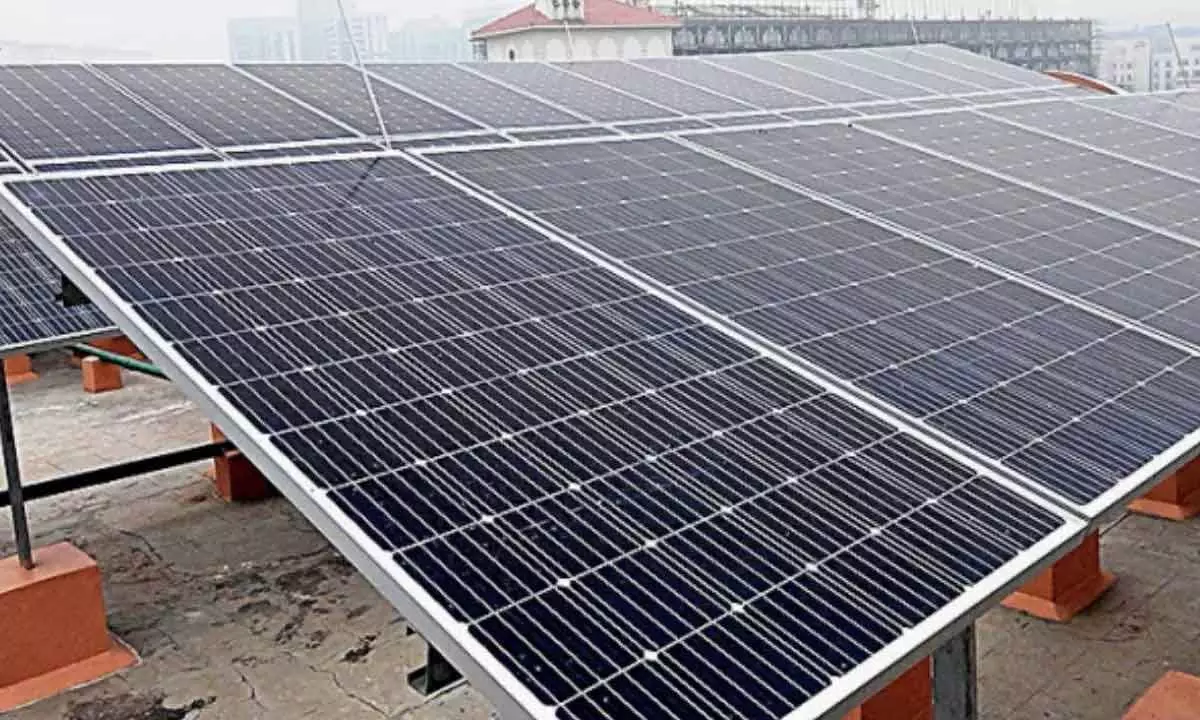Official apathy haunts rooftop solar scheme in TG
Unpaid dues, slow approvals, faulty meters and bureaucratic hurdles plague rooftop solar programme in Telangana
image for illustrative purpose

Hyderabad: The Grid Connected Rooftop Solar programme, subsumed under the PM Surya Ghar Muft Bijli Yojana, has been promoted at many platforms as a source for additional income generation. Though beneficial in many ways, the scheme’s implementation paints a sorry picture in Telangana.
Unfair surcharges, non-payment of additional solar energy sold to local discoms, slow-paced execution of processes by authorities, and other issues has made people raise questions about the intention of the Telangana government in promoting the clean energy initiative of the central government.
RVS Raju, a resident of Nizampet in Hyderabad, got a 5kW solar system installed in 2022. He also entered an agreement with the local discom TSSPDCL for net metering connection. Two years down the line, Raju is yet to receive the excess amount he shelled out due to a faulty meter.
“Initially, after installation of the solar system, we received monthly power bills running into thousands. Despite submitting a complaint to Pragathi Nagar sub-station in the locality, we ended up paying the amount for consecutive five months or so. Later, during inspection the officials found fault in the net meter and replaced it. Now in 2024, even after repeatedly mailing the local Discom, I haven’t been reimbursed. Moreover, I haven’t even received any amount from selling the additional energy,” Raju told Bizz Buzz.
According to an empanelled vendor, a customer can earn Rs 4.50 per kW by selling the additional solar power. However, first priority is given to adjust the reserve unit with the next month usage. After six months, the local discom has to pay for the buffer units, for which, the local discom enters an agreement with the customer after collecting Aadhaar and bank account details for disbursal of the amount.
DLN Varaprasad, another applicant of the scheme, slammed lethargic authorities of the concerned government departments for hindering the success of clean energy programme. He alleged, “The problem is not with the process of installing solar system under the scheme, but it is the people in authority executing it. As a senior citizen, is undergoing two-month of stress worth it?”
Varaprasad got a solar system installed in February. He found delay in receiving the feasibility report, inspection report and installation of net meter. He pointed out, “The AE is not bothered to send out the meters on time. While giving out feasibility report itself, the discoms should be ready with the meters. There was a lag between installation of solar system and meter, which means a loss of energy generated. Now, I have submitted all the requirements for subsidy. Not sure by when will I receive it.”
While this is the ground reality faced by individual household applicants, Resident Welfare Associations (RWA) of gated communities are caught in a fix. After the phase-2 of the solar programme was subsumed under the current scheme, the related national portal has been facing a glitch. The platform is not accepting documents of applicants under the RWA category.
Narasimha Rao, president, Owners Welfare Association-Concrete Palazzo, said: “We have spent around Rs 50 to 60 lakh for the installation. According to the procedure, now we are supposed to apply for a meter and subsidy, but the national portal is not accepting our documents. At one end we are paying bank interest and other end the electricity bill. We are not able to generate solar power from last three months.”
Radha Krishna, Secretary of another RWA in Hyderabad, lamented that banks declined to offer any loans for installation of 20kW solar system. He informed, “We are ready to get it installed if bank sanctions the loan. They are saying that they will give loans for individual houses and not to RWAs. We have approached Canara bank, as our association has accounts with them. We also enquired with Union Bank, HDFC and ICICI bank.”
The subsidy announced by Centre for group housing society / resident welfare association is Rs 18,000 per kW for common facilities, including EV charging, up to a limit of 500 kW capacity (3kW per house). This subsidy amount supports gated communities to save huge on solar system installation and subsequently on electricity bills.

